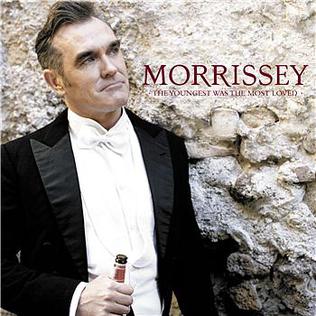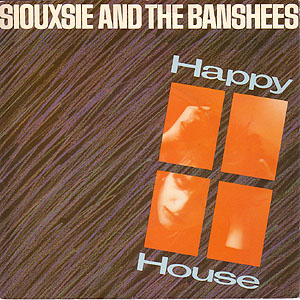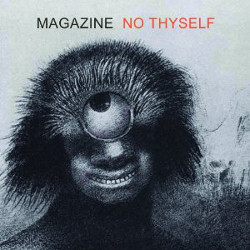
Siouxsie and the Banshees were a British rock band formed in London in 1976 by vocalist Siouxsie Sioux and bass guitarist Steven Severin. They were widely influential, both over their contemporaries and later acts. The Times called the group "one of the most audacious and uncompromising musical adventurers of the post-punk era".

Magazine were a British rock band formed in 1977 in Manchester in England by singer Howard Devoto and guitarist John McGeoch. After leaving the punk group Buzzcocks in early 1977, Devoto decided to create a more progressive and less "traditional" rock band. The original lineup of Magazine was composed of Devoto, McGeoch, Barry Adamson on bass, Bob Dickinson on keyboards and Martin Jackson on drums.

Howard Devoto is an English singer and songwriter, who began his career as the frontman for punk rock band Buzzcocks, but then left to form Magazine, an early post-punk band. After Magazine, he went solo and later formed indie band Luxuria.

John Alexander McGeoch was a Scottish musician and songwriter. He is best known as the guitarist of the rock bands Magazine (1977–1980) and Siouxsie and the Banshees (1980–1982).

Barry Adamson is an English pop and rock musician, composer, writer, photographer and filmmaker. He came to prominence in the late 1970s as a member of the post-punk band Magazine and went on to work with Visage, Nick Cave and the Bad Seeds, and the electro musicians Pan Sonic. In addition to prolific solo work, Adamson has also remixed Grinderman, The Jon Spencer Blues Explosion, Recoil and Depeche Mode. He also worked on the soundtrack for David Lynch's surrealistic crime film Lost Highway.

"Everybody Is a Star", released in December 1969, is song written by Sylvester Stewart and recorded by Sly and the Family Stone. The song, released as the B-side to the band's 1970 single "Thank You ", reached number one on the Billboard Hot 100 in February 1970 at a time when chart position for both sides of the single were measured equally and not independently. "Star" was intended to be included on an in-progress album with "Thank You" and "Hot Fun in the Summertime"; the LP was never completed, and the three tracks were instead included on the band's 1970 Greatest Hits compilation. The single was the final classic-era Family Stone recording; it would be 23 months until the next release, the single "Family Affair" in late 1971.

Juju is the fourth studio album by British rock band Siouxsie and the Banshees. It was recorded at Surrey Sound studio with Nigel Gray as co-producer, and was released on 19 June 1981 by Polydor Records. Two singles were released from Juju: "Spellbound" and "Arabian Knights".

Real Life is the debut studio album by English post-punk band Magazine. It was released in June 1978 by record label Virgin. The album includes the band's debut single "Shot by Both Sides", and was also preceded by the non-album single "Touch and Go", a song from the album's recording sessions.

"The Youngest Was the Most Loved" is the second single from English singer-songwriter Morrissey's eighth studio album, Ringleader of the Tormentors (2006). The track was written by Morrissey and Jesse Tobias. It was released as a single on 5 June 2006 and reached number 14 on the UK Singles Chart. The song was performed on the popular UK television chat show Friday Night with Jonathan Ross on 19 May 2006 and again on Later with Jools Holland on 2 June 2006.
The Armoury Show were a British new wave band, formed in 1983 and consisting of Richard Jobson on vocals, Russell Webb on bass guitar, John McGeoch on guitar and John Doyle on drums.

"Happy House" is a song written by Siouxsie Sioux and Steven Severin and recorded by their band Siouxsie and the Banshees. It was released as a single in March 1980 by record label Polydor, then later included on the band's third album, Kaleidoscope. "Happy House" was the group's first record made with guitarist John McGeoch and drummer Budgie.

"Spellbound" is a song by English gothic post-punk band Siouxsie and the Banshees. The group wrote it and co-produced it with Nigel Gray. It was released in 1981 by record label Polydor as the first single from the band's fourth studio album, Juju.

Secondhand Daylight is the second studio album by English post-punk band Magazine. It was released on 30 March 1979 by record label Virgin. One single, "Rhythm of Cruelty", was released from the album.

Dave Formula, is an English keyboardist and film-soundtrack composer from Manchester, who played with the post-punk bands Magazine and Visage during the end of the 1970s and the beginning of the 1980s and in the "world music" band The Angel Brothers.

Magic, Murder and the Weather is the fourth studio album by English post-punk band Magazine, and their final album until the band's reformation in 2009. It was released in June 1981 by record label Virgin. One single, "About the Weather", was released from the album.

"Shot by Both Sides" is a song written by Howard Devoto and Pete Shelley, and performed by the English post-punk band Magazine. It was released in January 1978 as the band's first single, reaching No. 41 on the UK Singles Chart and appearing, a few months later, on their debut album Real Life. The song has been cited as a seminal work of the post-punk genre, as well as of pop punk and new wave.

John Doyle is an English drummer, who was a member of new wave bands like Magazine and The Armoury Show. He reunited with Magazine for a tour in February 2009.

Jerky Versions of the Dream is the only solo album recorded by Howard Devoto, the original singer of Buzzcocks and Magazine. It was his only studio album, which was released at the time with two singles, "Cold Imagination" and "Rainy Season", being a short-lived solo career for Devoto, who in 1986, went to form a band alongside guitarist Noko, which later was named Luxuria.

No Thyself is the fifth and final studio album by the band Magazine, and the first since their 2009 reformation. It was released on the Wire-Sound label on 24 October 2011, about 30 years after the release of their previous studio album, Magic, Murder and the Weather.

Play is the first live album by English post-punk/new wave band Magazine. It was released in December 1980 by Virgin Records (International) and in April 1981 by I.R.S. Records (US). It peaked at No. 69 on the UK Album Chart. It was Magazine's sixth 1980 release.



















